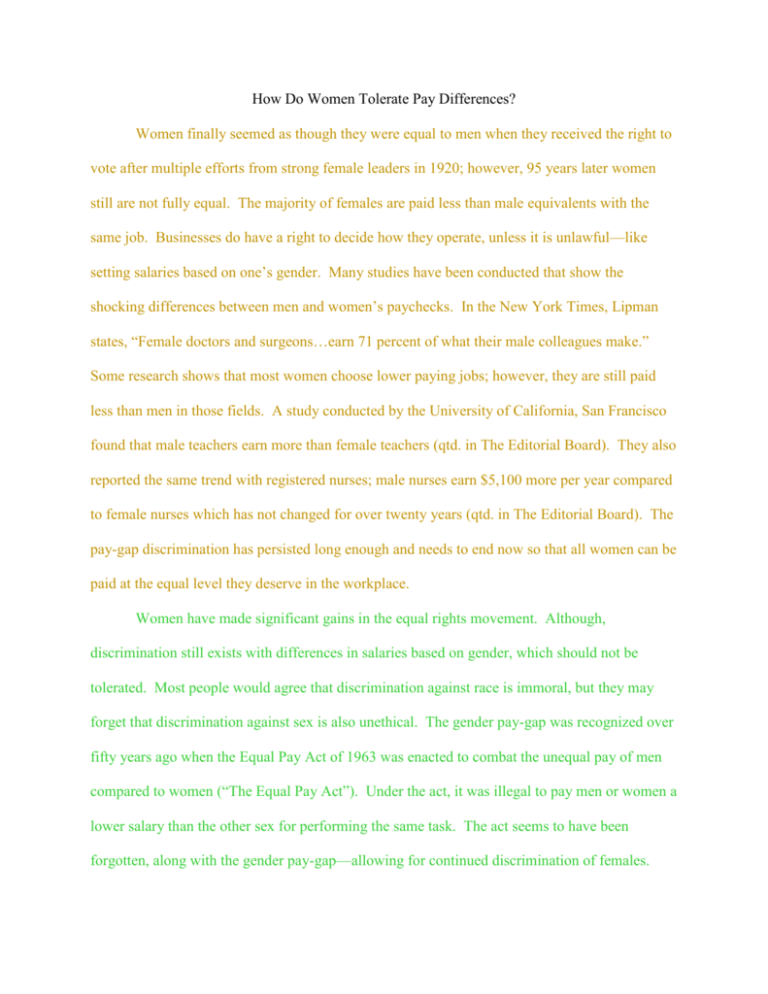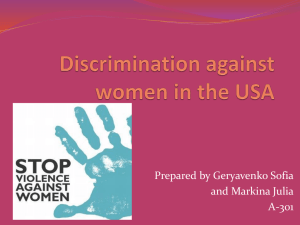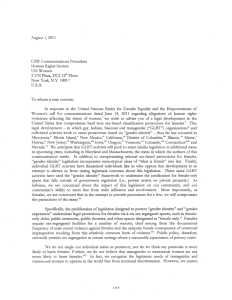How Do Women Tolerate Pay Differences? Women finally seemed
advertisement

How Do Women Tolerate Pay Differences? Women finally seemed as though they were equal to men when they received the right to vote after multiple efforts from strong female leaders in 1920; however, 95 years later women still are not fully equal. The majority of females are paid less than male equivalents with the same job. Businesses do have a right to decide how they operate, unless it is unlawful—like setting salaries based on one’s gender. Many studies have been conducted that show the shocking differences between men and women’s paychecks. In the New York Times, Lipman states, “Female doctors and surgeons…earn 71 percent of what their male colleagues make.” Some research shows that most women choose lower paying jobs; however, they are still paid less than men in those fields. A study conducted by the University of California, San Francisco found that male teachers earn more than female teachers (qtd. in The Editorial Board). They also reported the same trend with registered nurses; male nurses earn $5,100 more per year compared to female nurses which has not changed for over twenty years (qtd. in The Editorial Board). The pay-gap discrimination has persisted long enough and needs to end now so that all women can be paid at the equal level they deserve in the workplace. Women have made significant gains in the equal rights movement. Although, discrimination still exists with differences in salaries based on gender, which should not be tolerated. Most people would agree that discrimination against race is immoral, but they may forget that discrimination against sex is also unethical. The gender pay-gap was recognized over fifty years ago when the Equal Pay Act of 1963 was enacted to combat the unequal pay of men compared to women (“The Equal Pay Act”). Under the act, it was illegal to pay men or women a lower salary than the other sex for performing the same task. The act seems to have been forgotten, along with the gender pay-gap—allowing for continued discrimination of females. I believe the pay-gap is wrong not only because it violates the Equal Pay Act, but also because it suggests women are inferior to men. Today, the view of women being inferior has changed as women have been given more opportunities to apply for jobs traditionally held by men. My school does have significant numbers of girls in advanced courses. I believe their dedication to higher education deserves a career with the same pay as a man. Once I become a research scientist in a laboratory, I would be very upset if a male lab member makes more money than me since I will have worked just as hard, or harder, to get the same position. Women have proven themselves as valuable workers and pioneers in difficult fields as there are many females who have made noteworthy discoveries. Females need to be paid the same salaries as men if they both have equal qualifications needed for the job. Paying both sexes equally is not an award for women, it is ethically correct to give them the same rights and opportunities. Information regarding pay differences between genders is not regularly checked; therefore, companies probably do not realize they are violating women’s rights. The pay-gap has also remained largely unaltered for the last few years, so violators may think the issue no longer exists, even though it does. In addition, businesses may believe that women should be paid less since they tend to take off work more often to care for their family. If males were the ones who took care of the kids more often, it would not be fair to pay them less money. Just because an employee has kids does not mean that they do their job to a lesser degree than an employee without children. Paying women or men less for any reason if they are equally qualified is discrimination and needs to be recognized by employers. The pay-gap has persisted for too many years and the longer it continues, the more people will believe it is no longer a problem. To halt the pay-gap between the sexes, I can write to my senator to propose a law which would pay women and men equally in Arizona. My suggestion would also require businesses to submit their records of all employee salaries to a committee to enforce equal payment. It would spread awareness about the issue to other states and businesses and encourage action to close the pay-gap. I could also mention the pay-gap to my future sorority and professional organizations to familiarize people with the issue so that it does not fade from the public’s attention again. By taking these measures, I can help ensure all women are paid equally sooner rather than later. Works Cited The Editorial Board. “Women Still Earn a Lot Less Than Men.” The New York Times. The New York Times Company, 14 April 2015. Web. 5 November 2015. “The Equal Pay Act of 1963.” U.S. Equal Employment Opportunity Commission. USA Government, 2015. Web. 7 November 2015. Lipman, JoAnne. “Let’s Expose the Gender Pay Gap.” The New York Times. The New York Times Company, 13 Aug. 2015. Web. 6 November 2015.








